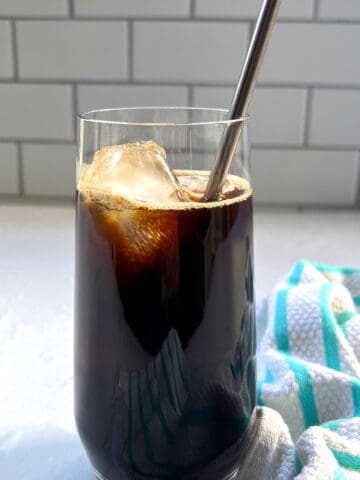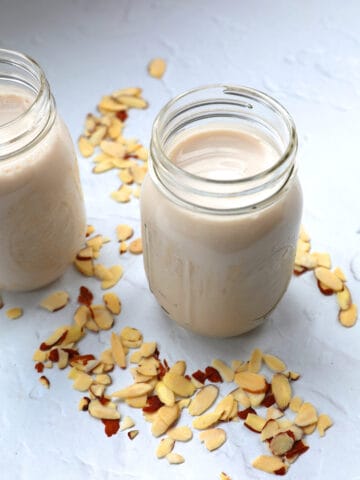From promoting gut health to helping alleviate anxiety, Kombucha is reported to have a variety of health benefits. But what if you have a gluten intolerance? Is kombucha gluten free? Let’s take a look at what’s in kombucha and whether it fits with a gluten-free diet.

If you have Celiac disease, have a gluten sensitivity or allergies, or are simply trying to limit your gluten intake, you know it can sometimes be difficult to find products compatible with a gluten-free diet. And it may not always be clear which products have gluten and which don’t. That can be true when it comes to kombucha as well.
The good news is that In many cases, Kombucha is gluten-free. Many of the largest kombucha brands do not use gluten in their drinks.
Brew Dr., Health-Ade, and GTs organic kombucha list some or all of their kombucha as gluten-free. But this isn’t always the case with all kombucha brands. Read on to find out more.

Jump to:
What is kombucha?
Kombucha is an effervescent, fermented tea drink that’s usually made by fermenting black tea or green tea with sugar and a mixed culture of yeast, lactic acid bacteria, and acetic acid bacteria (known as SCOBY). Together, these ingredients give kombucha a tangy, sweet, refreshing flavor.
The fermentation process also produces small amounts of alcohol in the drink, but this is usually less than 0.5% ABV.
However, some manufacturers add other ingredients like fruit juices, spices, extra sugar, or artificial sweeteners in an effort to enhance the taste. That’s why it’s important to check the label to see if the kombucha you’re buying really is gluten-free or not.
Does kombucha have health benefits?
The good bacteria in kombucha’s SCOBY mixture is reported to contribute to a wide range of nutritional benefits — in part by helping to fight off bad bacteria.
Health benefits of kombucha can include encouraging gut health, limiting digestive issues, boosting your immune system, and helping with weight loss. Some say it can even help prevent bad breath and protect against diabetes.
Kombucha also is rich in antioxidants, which can reduce the risk of heart disease.
While further study is needed to determine the specific health benefits of kombucha, research on some of its ingredients, such as green and black tea, has been shown to lower cholesterol, regulate blood sugar levels, and reduce belly fat.
Is hard kombucha gluten free?
The main difference between regular kombucha and so-called hard kombucha is the level of alcohol. Hard kombucha is considered an alcoholic beverage. It’s made with added sugar and yeast which is fermented for longer in order to boost the drink’s alcohol levels.
Many hard kombuchas can contain between 3-5% alcohol by volume. But most are gluten free, as the original gluten-free ingredients (sugar and yeast) are still being used; just in larger quantities. They’re generally free of gluten-containing grains like wheat and barley, so in most cases, hard kombucha is compatible with a gluten-free diet.
What kinds of kombucha may contain gluten?
Since pure kombucha only contains tea, sugar, and SCOBY, it is naturally gluten free.
But some makers may produce a kombucha beer for example that includes barley and grains. That will add gluten to the finished drink. And it still may be labeled as kombucha instead of beer.
Others may simply add a form of barely to their kombucha tea, or in some cases Worcestershire sauce or soy sauce as in some bloody mary kombuchas, which also will not be gluten-free compatible.
The bottom line is: be aware of the ingredients that may be in your kombucha so you don’t inadvertently consume gluten.
Does the yeast in kombucha contain gluten?
While certain types of yeast, like brewer’s yeast used in beer-making, will contain gluten due to the barley it comes in contact with, the SCOBY yeast mixture in kombucha is gluten free. That’s because it only interacts with cane sugar and tea. It does not interact with any gluten ingredients.
Is homemade kombucha gluten free?
What if you make your own kombucha? Will it still be gluten free? As long as you stick to the core ingredients of tea, sugar, and kombucha SCOBY, your homemade kombucha will be gluten free. You can also add additional flavors like lemon, ginger, or other types of fruit juice and still produce a gluten-free kombucha.

FAQ
No, you shouldn’t shake it prior to drinking. Like other carbonated drinks, shaking Kombucha before you open will cause it to gush out, and possibly all over you! If you notice tiny particles in your drink, don’t worry. Those are natural bacteria that are produced when making kombucha.
While Kombucha is naturally carbonated, drinking it flat is safe and won’t harm the flavor. And the carbonation does not affect any potential health benefits. So, if you’re not a fan of the fizziness, there are non-carbonated varieties you can buy.
Bottom line
If you’re on a gluten-free diet or have gluten sensitivities, in most cases kombucha should be a compatible addition. While certain brands or types of specialty kombucha may add gluten-containing ingredients, pure kombucha and most hard kombuchas will be gluten free. Just check the label of the brand you buy to make sure.
More beverage answers
Looking for more answers to your beverage-related questions? Try these posts.






Leave a Reply